Throughout most of America there is a disconnect between who grew the food you’re buying and what it took to get it to your plate. A large part of it is our reliance on convenient foods and grocery stores. Whereas in Thailand, I’ve seen few grocery stores. There’s a heavy emphasis on shopping at markets and corner stores. It’s definitely a culture of what American’s would consider “farm to table”, when in Thailand it’s just their way of life.
Villages usually make their living from growing food and are sometimes solely dependent on only 1 or 2 crops. We heard first-hand from a coffee grower the differences in the number of times he was able to harvest due to environmental conditions. In short harvest amounts were down significantly in 2019 due to a drought. If people don’t have the resources to irrigate their crops, their income will drop. Additionally, in the United States we tend to focus on the effects of climate change surrounding rising sea levels resulting in lost coastal lands, and more intense storms. It’s different in Thailand. Climate change results in an income change. It very much so directly affects their lives.
In Minnesota I work on a farm selling plants in the spring switching to selling the produce we’ve grown by mid-July. We have regulars who always buy from us at the markets. I’ve only worked on the farm two seasons now, but some of our regulars have been coming for many, many years and know the family well. I’m assuming in Thailand things could be similar; there’s regulars that may always buy things from you, or you may trade goods, and there’s people who aren’t regulars.
In the spring, summer, and fall I shop at grocery stores very minimally, relying heavily on what’s at farmers markets. While I understand it’s not feasible for everyone, there’s this big wave to get more people to do the same. In Thailand, they already do it. Maybe it’s because there aren’t grocery stores everywhere to shop at, or this culture is only at the beginning of switching to unhealthy convenient food options (grab and go), there’s less dependence on a microwave when preparing food, or plain and simple: they value food differently than we tend to.



